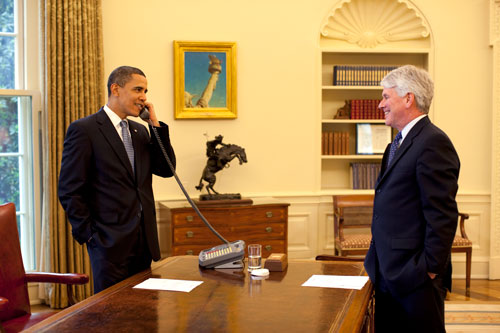
UPDATE: Gregory Craig was acquitted of felony charges. Skadden Arps reportedly reached a settlement with Ukrainian ex-prime minister Tymoshenko.
Longtime Washington establishment lawyer Gregory Craig has been indicted for making false statements to federal investigators and for failure to comply with the Foreign Agents Registration Act [FARA]. This is among the dominos falling from the Muller special counsel investigation into Russian influence into the 2016 national election.
Craig is a seasoned criminal lawyer. His legal team will doubtless mount a spirited defense.
While attention is turned to the scope of the registration requirements of FARA, the most important aspects of this matter may not be the illegality at issue. What’s astonishing is the legal conduct exposed by prosecutors.
The Scandal is What’s Legal
The scandal isn’t what’s illegal, the scandal is what’s legal. —Michael Kinsley
Federal indictments, like most legal documents, tend to be dry. They are stylized to extract the individuality of the prosecutors and the accused in the service of justice. The law, in its majesty, transcends personalities.
Now and again, one encounters an exceptional case. The facts are so astonishing that they break free from the limitations of the form.
So it is with the Craig indictment.
Craig, while a partner in a respected international law firm based in the United States, received more than $4 million to publicly advocate on behalf of the Ukrainian government’s politically motivated prosecution of a rival, Yulia Tymoshenko.
Why would Craig’s intercession be so valuable? Craig conveyed the prestige associated with his law firm. This was surely enhanced by his recent service as White House counsel to President Obama. The activities outlined by prosecutors were undertaken by Craig while the Obama administration remained in office, conferring additional weight to his words and deeds.
Such factors demonstrate why Craig’s participation was prized by a Ukrainian regime facing negative publicity for an apparent abuse of the administration of justice.
The indictment includes a telling detail illuminating Craig’s state of mind. The accused had drafted a “memorandum to file” stating his judgment that evidence of Tymoshenko’s criminal intent “is virtually non-existent.” The indictment notes, in spare language that is unsparing in its implications, that Craig did not publicly disclose his inconvenient conclusion.
The Demise of the Lawyer-Statesman Ideal
Gregory Craig possesses a sterling resume. Top-flight education, prestigious private legal practice, and high-level government service. All of which make these circumstances not only challenging for him, but also concerning for others.
If Craig’s background is unusually strong, his approach to the Ukrainian prosecution, according to the indictment, is all too familiar in today’s Washington. Even the most highly placed lawyers appear to be inured to moral and patriotic considerations. The only limiting standard is explicit illegality.
Such lawyers may serve their firms. They may serve their clients (including rather unsavory ones, such as the Ukrainian regime in this instance). What’s missing is any meaningful sense that they’re serving America’s public or national interest. They appear to be unmindful of the need to safeguard institutions, including the legal profession.
Craig, if the allegations in the indictment are established in the judicial process, is far from alone in taking this approach. It’s epidemic among lawyers today.
What should concern all of us is the ongoing decline of the lawyer-statesman ideal. The United States is unique in being established from covenants between citizens and generations through our Constitution and Declaration of Independence. Lawyer-statesmen—Adams, Jefferson, Hamilton, Madison, Marshall, et al.—guided us from the start. Lincoln stands as the epitome of the tradition. Through the first half of the twentieth century, noted lawyers such as Elihu Root and John McCloy maintained and extended the tradition.
When he sought the presidency in 1980, Congressman John Anderson reportedly asked McCloy for recommendations of rising lawyers who could play such outsized roles, moving easily between public and private life. McCloy is said to have responded that such specimens were nowhere to be found. In the mid-1980s, Chief Justice of the United States William Rehnquist declared that the era of the lawyer-statesman was ending.
Some won’t mourn the demise of the lawyer-statesman. Critics can point to chinks in the armor of the strongest reputations, ranging from Jefferson and Hamilton, to Lincoln, to Root and McCloy. That’s missing much of the point. What matters is that the ideal has been forsaken. Ideals, by definition, are aspirational. We aim for them. We move toward them. We’re better for confronting the challenge, our reach always exceeding our grasp.
Such ideals represent higher standards than deploying clever legalisms to achieve unjust ends. Without such ideals, rationalized selfishness can remorselessly erode institutions and customs erected on a foundation of trust and restraint in service of the common good.
Gregory Craig and the Demise of the Lawyer-Statesman Ideal
